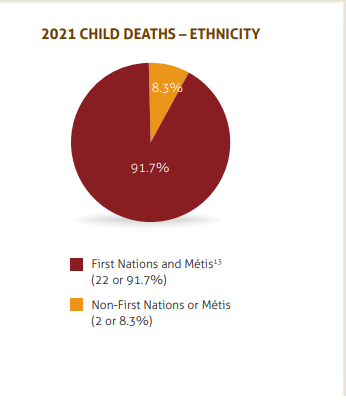The Saskatchewan Advocate for Children and Youth released a report that shows the extent of the crisis that youth of Saskatchewan are facing and it gives a stark reminder of how Indigenous children and youth are affected disproportionally.

Advocate Lisa Broda stated in her report, “Child-serving governments and agencies must put increased investments into services for young people to address the long-standing issues plus the fall-out from the pandemic.”
Findings of the report suggest that youth and children are not getting the help they need when it comes to mental health, addictions, safe environments and care.
The Saskatchewan advocate for children and youth office receives notification of and reviews the deaths and injuries of children who are receiving or have recently received child welfare and/or justice services.
The document said that four young people died by suicide and 13 tried to take their own lives in 2021.
Most of the deaths and injuries reported involved children in care receiving help from a child and family services agency.

A majority of the deaths and suicide events from 2021 involved Indigenous children or youth. Broda says this emphasizes the need for access to culturally significant mental health services.
In 2021, 92 per cent of the deaths and 79 per cent of the critical injuries that came to attention involved Indigenous children and youth.


Gabrielle Ermine, an Indigenous-focused mental health therapist, helps youth and families deal with trauma and grief.
She said that there are Indigenous youth and families falling through the cracks because they are unable to get the resources needed for managing the trauma they have endured. When they don’t have trained staff to deal with the young people, it contributes to the problem, she said.

Get weekly health news
Depression and anxiety rates are on the rise as a lot of young people are grieving, having suicidal ideations and suffering from loneliness. A lot of them don’t know how to pray and are being isolated without resources, not knowing where to go.
“The families that I’m dealing with are faced with moms and dads having no job, who are battling, finding rentals in the city, having crowded spaces on the reserve, having their own mental health issues, on top trying to survive and provide for their families leading to anger, violence and therefore breakups, separations and again isolation continues, loneliness continues.”
She said that in turn impacts children whose basic needs are not met, like food and shelter. She added they are forced to flee a situation because of the violence and they don’t have a a stable home.
Ermine added that some of the Indigenous youth have been Christianized and colonized so they don’t know how to pray, how to start seeking elders or being able to reach out to their medicines that they have inherited. They are not able to be part of the ceremonies and are scared of their own culture because of the trauma.
She feels that sovereign Indigenous child welfare is a critical and major step in caring for Indigenous youth and children, adding that agencies and people responsible for care need to be educated on trauma and have that Indigenous-focused training.
Beverly Balaski, executive director at RPNAS (Registered Psychiatric Nurses Association Of Saskatchewan) said psychiatric nurses are educated and trained to take care of intergenerational trauma. “As we know trauma often leads to addictions and other mental illnesses so we are in a position to provide services, even community services to assist people with those needs,” she said.
The report also points to barriers children in care have been facing over the last pandemic year with family visits and accessing support services.
It talks about students across Saskatchewan showing signs of decreased overall wellness, with interrupted extracurricular activities and poor or no access to in-person learning.
The document adds that services for autism, special needs assessments, mental health and other needed support services were impacted due to the pandemic. Many delays occurred due to the redeployment of professionals working within these areas.
Balaski said, “when care is delayed conditions can become more complex, more pronounced, there is more risk of adverse events,” focused on early intervention and positive patient outcomes.”




Comments